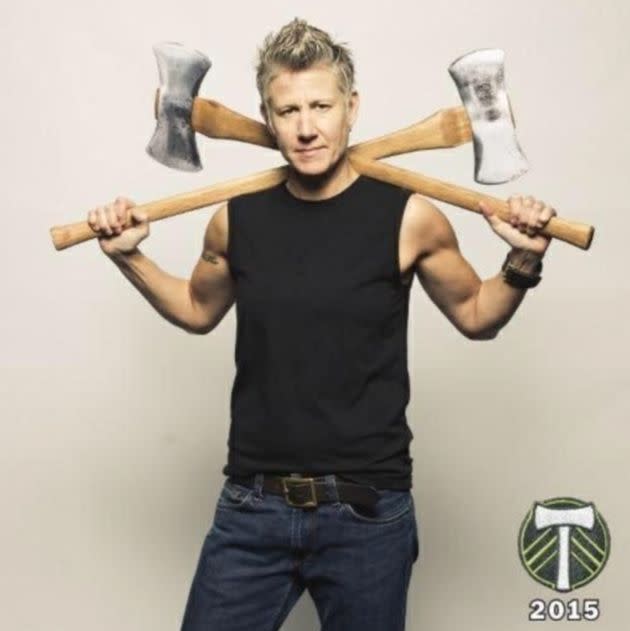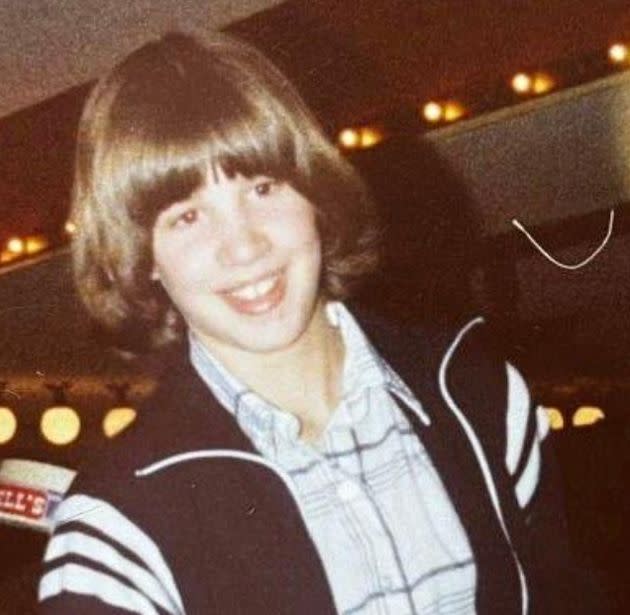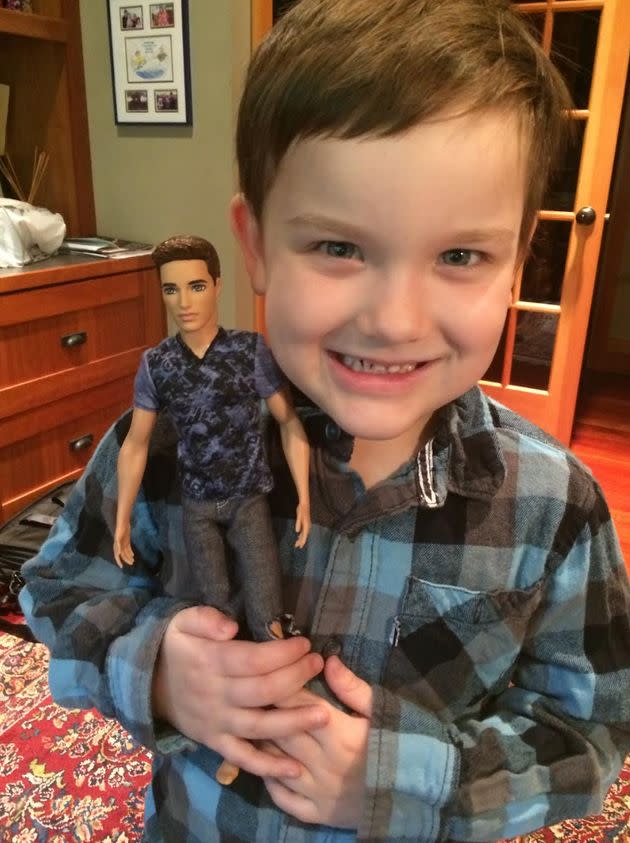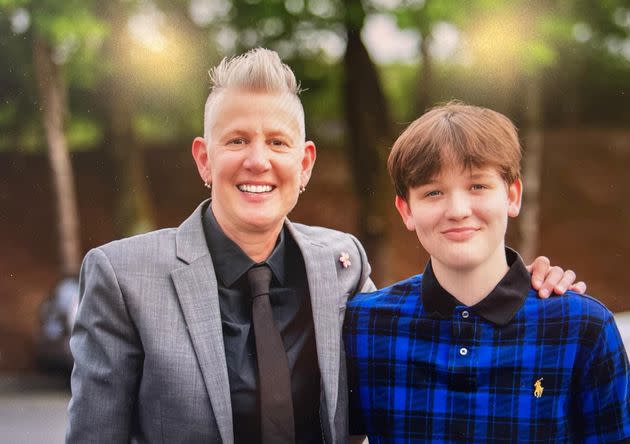An 8-Year-Old Girl Asked To Meet Me. When We Came Face-To-Face, I Had To Hold Back Tears.

In 2015, I had the honor of being featured on a billboard for the Portland Timbers soccer club. The process of being chosen was intense. Hundreds of Oregonians competed for online votes and pushed for their photo to be selected. After a week of voting, my picture was picked as a winner!
As a butch lesbian who always felt like an outsider, I was honored, humbled and terrified all at once. I had spent much of my lifetime hiding who I was from the world. But there I was, on a 20-foot billboard, muscles flexed, as I posed with two axes over my shoulders in an image that flaunted a bravado and confidence that I never could have imagined.
What a transformation I had made from a closeted little girl who was scared to admit she was gay to an out, big butch lesbian on a billboard. It was a very proud and monumental moment of my life, and it led to my meeting a young girl named Snapper.
A few years after the billboard went up, a client asked if I’d meet with her friend, whose 8-year-old daughter, Snapper, had come out as gay. I was confused as to why this young girl wanted to meet me, as she knew nothing about who I was except that I was on a billboard. I neither had children nor particularly wanted them, so was lost as to what I could offer this young girl.

Thinking about Snapper made me think of my own childhood. I grew up as a closeted lesbian in the late 1970s. For most of my adolescence, I thought I was simply a tomboy, as I always gravitated toward stereotypical boy activities, like playing with toy trucks and digging for hours in the mud. I almost always wore jeans, usually with holes in the knees, and T-shirts covered with dirt. The phrase “she’ll grow out of it” was tossed around so much that I started to feel like it was etched on my forehead.
As I got older, I began to understand that it wasn’t really my tomboy appearance or behavior that was concerning to the outside world; it was a question of my sexual orientation. I was a lesbian born during an era when few people were out of the closet — certainly no one in my world. Homophobia was very much a part of the culture at the time. Jokes and snide commentary about the “homosexuals and gays” (and the ugly slurs people used for us) were part of the daily vernacular I heard in school hallways, in locker rooms, on television and, every so often, around the dinner table.
Because I had no one to turn to — and definitely no openly gay role models — my life was almost unbearable. Each morning, I put on my cloak of heterosexuality in hopes of being seen like everyone else — like I was “normal.” Then every night, my facade fell to the floor, and I hid under my blankets and cried myself to sleep. As I went through my teen years, I longed for love — to be loved. I could not understand why someone like me was born into this world without someone — anyone — who could see and accept the real me.
For years I acted like I was straight — sometimes even convincing myself. I started drinking at a young age, which helped dull my mind and tricked my senses into believing that this dysfunctional strategy would work. But ultimately, there was no way around it — I was a lesbian.
I met my first real love when I was 26. It was the mid-90s, and homophobia was still widespread. However, with my girlfriend by my side, I became brave enough to come out publicly, first to my family and then to my friends — which is a story for another day.
As I was coming out, I noticed that more and more people had started venturing out of the closet. Change was happening. Pride parades, protests against anti-LGBTQ legislation, and marches on Washington became more prevalent. But despite all the positive momentum, I still didn’t see myself in mainstream culture.

Then Ellen DeGeneres had her famous coming-out moment. I could not believe it — this smart, beautiful, funny, kind woman was on national TV announcing that she was gay! I could see so much of myself in her — sure, she was funnier and more entertaining, but she dressed like me, wore her hair like me and, most importantly, she was a lesbian, like me! I couldn’t believe it! Ellen coming out meant the world to me and a multitude of others who, for decades, were told that we are abnormal (or worse) and should hide who we are.
I agreed to meet Snapper and will never forget seeing her for the first time. She was waiting for me on the balcony of her home in Portland. She was dressed in Bermuda shorts and a crisp, short-sleeved, blue shirt, buttoned all the way up to her chin. “She’s here, Mom! She’s here!” I heard as I pulled up. I laughed as I parked because I wasn’t quite sure what I was walking into.
“Welcome!” said Jaimee, Snapper’s mother, as she motioned me inside. I turned to Snapper, put out my hand, and said: “It’s a pleasure to meet you. I love your outfit — it’s very dapper!” Snapper broke out into a huge smile, which she tried to contain, and offered a quiet “thank you.” As we went inside, Jaimee whispered, “Snap changed her outfit five times before you arrived and at one point had on a tux.” My heart nearly exploded, and it took everything I had to conceal my reaction.
We sat down to talk, and Snapper told me how she came out on her first day of kindergarten. Apparently, the teacher asked everyone to introduce themselves and say something about who they were — and Snapper said, “Hi, my name is Snapper, and I am gay.”
After school, when Snapper told this story to her family, they were shocked. Not because Snapper was gay, but because Snapper had never actually said it out loud. Jaimee told me: “We had never talked about her being gay, just that people could be straight or gay, or somewhere in between. I asked her what ‘gay’ means, and Snap was very matter-of-fact about how some people will grow up and marry a boy, and if she marries someone, they will be a girl— and that was it.”
Here we were, two years later, and I was meeting this sweet young girl who firmly identified as gay. Jaimee told me that she reached out to her friends to find a “strong, amazing gay person” who would come talk to Snapper. “I wanted Snap to meet someone that reflected certain parts of her that she could identify with,” Jaimee said. “I also wanted her to understand that the path she was on had been carved by a whole community of brave, strong humans.”

Thinking back on the impact of seeing myself reflected in Ellen, I wondered if I could be that person for Snapper. Then the lightbulb came on: Of course! Snapper was a sort of “mini-me,” and even though her immediate family loved and supported her, homophobia still runs rampant. She most likely needed to see someone who was, in many ways, just like her and who could assure her that she could — and should — live her life exactly the way she is.
As Snapper and I spoke on that first day, it quickly became apparent why I was there. Snapper didn’t look or act like most girls her age, and that made her an easy target to be called out and misgendered.
“You know,” I started, “because I’m a butch lesbian and I have a very masculine appearance, I’ve been teased a lot in life, and still get mistaken for a boy all the time.” As I said this, I saw a sliver of a smile appear on Snapper’s face and then rapidly disappear. “Well, what do you do when they call you a boy?” she asked.
“It depends, I guess. Usually, people are just ignorant and oblivious, so I correct them and tell them I’m female,” I replied. “Most people are slightly embarrassed and apologize quickly, but you know, some people are just jerks. Ignore them if you can. They’re just insecure and need to make others feel bad.” Snapper seemed relieved when I said this — like, it wasn’t just her that was different, and I seemed to have gotten through it all OK!
Our conversation continued and Snapper invited me to see her room. It seemed almost surreal that I was in this stranger’s house, listening to this young, self-identified lesbian excitedly rattle on about what she was into. I had a few moments of holding back tears because I was overwhelmed by the entire situation. I knew I wanted to be a role model and help other LGBTQ people, but I always thought it would be more in line with visibility and the creation of community events; it never crossed my mind that I could be a giant, in-person mirror for a young person struggling to see herself in the world.

I stayed in Snapper’s life, and I’ve spent time with her and her family at basketball games, family dinners and birthday parties. Over the past seven years, I have seen Snap grow more into herself, and our conversations have changed as she seeks to navigate new and unique challenges in sports, relationships and family. She recently got her driver’s permit and even started dating — something I couldn’t fathom when I was her age.
Jaimee once told me how meaningful my place in Snapper’s life has been. “Meeting you was a seminal moment for not only Snapper, but for our family,” she said. “There are parts of Snapper’s journey we will never be equipped to help with — we can read and talk and console, but we cannot truly relate to what it is like to walk through this world being externally distinguishable from others in this certain way. In a time when Snapper was regressing to the shadows, you showed up, and kept showing up, and you pulled her to the front. We are truly grateful.”
I’m incredibly humbled to be seen by someone as bold and brave and strong as I posed myself to be on that Timbers billboard from long ago. When I agreed to meet Snapper, I had no idea what would happen or if my story would mean anything to her. But I knew how desperately I wanted to meet someone like me when I was her age, and I hoped my time with her might matter. I’m so grateful it did.
It mattered to me, too. Having Snapper enter my life gave me the opportunity to help someone else trying to navigate a sometimes frightening, bigoted world, where being different can be dangerous in so many unthinkable ways. It reminded me that our differences can be superpowers and that using them to help others can have incredible, even life-altering effects. And I was able to be a visible, living example of hope and to share something precious I never heard when I was young: You are 100% beautiful and perfect just the way you are.
Shaley Howard is the author of the recently released book “Excuse Me, Sir! Memoir of a Butch.” She’s a small-business owner and an award-winning activist in Portland, Oregon. She was recently recognized as one of Go Magazine’s “100 Women We Love” and the recipient of Q Center’s “Quasar” Constellation Award for outstanding community involvement. In her spare time, she loves exploring the Pacific Northwest and hiking with her adorable dog, Dingo.
Do you have a compelling personal story you’d like to see published on HuffPost? Find out what we’re looking forhere and send us a pitch at pitch@huffpost.com.

